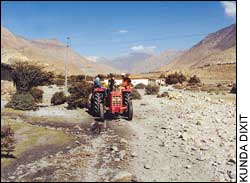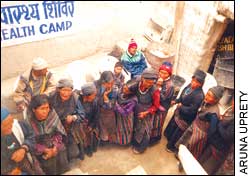 Q: Do you know the name of present king of Nepal?
Q: Do you know the name of present king of Nepal? A: No.
Q: Do you know the name of Prime Minister of Nepal?
A: No.
Q: Do you know that in Nepal there is a state of emergency?
A: No.
Q: Do you know anything about the election that will take place soon in Nepal?
A: What election?

Of the 200 women we interviewed at health camps in Mustang recently, only two knew the answers to the above questions. And it is easy to see why: this is the part of Nepal where there is no insurgency, no emergency, no checkpoints, no questions. Who am I, where am I going? No one rummaging through my rucksack.
Having travelled through the Maoist heartland of the midwest earlier this year, I was used to these hassles. The security forces were suspicious of medical supplies: where was I taking the medicines? Who was I treating? Did I have a letter from the Ministry of Health?
But in Mustang, I was in the real Nepal of the old days: where you could travel freely, where people are not suspicious of strangers, and indeed welcome them into their homes. Maya Bista at Ghami cooked for us, and wasn't sure we would like her millet chapatis, but they were so delicious, they became our staple throughout our journey to Lo Manthang and back.
The nutritious food of the people of Mustang is one of the reasons for their good health. Millet, barley, potato, and milk are widely available, and rice now comes down from Tibet along the highway from the border to Lo Manthang. In comparison to far-west Nepal, very few of the women we treated suffered from malnutrition.
The other difference is that of the nearly 300 women examined, there wasn't a single case of prolapsed uterus, which is such a common affliction in the far-west. Successive childbearing, lack of rest during maternity and hard work has made prolapsed uterus an epidemic in the mountains of western Nepal. The medical problem is a direct result of the low social status of women there. Here in Mustang, the women had never heard of any such thing, and they had no word for it. One woman asked: "How can a woman survive, it is like having your heart or your intestine outside your body."
We were glad our hypothesis that women across the mountains of Nepal all suffer from prolapsed uterus was proven wrong. But the good health of women in Mustang is not due to health posts and hospitals-the level of medical neglect by the ministry in Kathmandu is as bad here as elsewhere in Nepal. No, it is directly related to the higher status of women in the family and community.
 A pregnant woman here is not denied certain foods, milk, or meat as she would in the midhill villages to the south. She is not forced to work, even when she is sick, and she does not have to sacrifice her life for the sake of her in-laws. A woman is treated as equal, eating together with other members of the family.
A pregnant woman here is not denied certain foods, milk, or meat as she would in the midhill villages to the south. She is not forced to work, even when she is sick, and she does not have to sacrifice her life for the sake of her in-laws. A woman is treated as equal, eating together with other members of the family. The harsh trans-Himalayan climate means work is hard, and winters are long. But, again, the big difference here is that in the fields or while grazing livestock the men and women work together. In one of the homes we stayed along the Kali Gandaki trail, we were woken up before sunrise by a seven year-old girl packing her bag happily and demanding that her mother fix tea. She wasn't going to school, her mother explained, she is off to the fields to take morning tea to her father. This wasn't exploitation, or child labour. This was an early inculcation into a work ethic.
It's not all as romantic as all that, of course. Mustang has a share of problems. Its remoteness and the arid climate make it difficult to survive just on farming and livestock. That is why there has traditionally been out-migration, and this process has accelerated. In the village of Chhuksang, nearly every young man or woman is either in Thailand or in Japan. Although this has brought remittances, little of that is going into village development. Locals invest in real estate in Pokhara or Kathmandu.
What is surprising is that despite the lack of health care and a district hospital that is four days walk away, and medicines are generally not available, the public health problems are not as acute as elsewhere in Nepal.
On the flight back to Pokhara, we thought: why can't the rest of Nepal be like Mustang: at peace, full of hardworking and happy people and where women are treated equally with men.
Something to wish for as we celebrate another Mustang Festival this week. Let's go to Mustang and find out how they do it.
(Dr Aruna Upreti is a women's health activist.)


